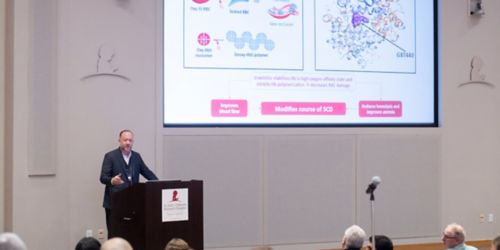St. Jude Family of Websites
Explore our cutting edge research, world-class patient care, career opportunities and more.
St. Jude Children's Research Hospital Home

- Fundraising
St. Jude Family of Websites
Explore our cutting edge research, world-class patient care, career opportunities and more.
St. Jude Children's Research Hospital Home

- Fundraising
Continuing medical education is a vital part of translating research to patient care

Science and medicine are constantly changing, and it’s imperative to stay abreast of advances in research and clinical practices. The St. Jude Continuing Medical Education program helps ensure our physicians are at the forefront of learning.
As science and medicine evolve, it’s important that physicians and other health care professionals stay connected with advances in education and developing trends to translate the latest research results into patient care.
This is especially true at St. Jude Children’s Research Hospital—where our clinicians treat patients who have been diagnosed with some of the world’s rarest illnesses. Our physicians need to be at the forefront of learning, which is the goal of the St. Jude Continuing Medical Education (CME) program.
Our CME program recently received Accreditation with Commendation, the highest honor bestowed by the Accreditation Council for Continuing Medical Education (ACCME). This honor is given to organizations that excel as CME providers. Forty percent of the 1,770 accredited providers in the U.S. are Accredited with Commendation, which includes a six-year accreditation term instead of the regular four-year term.
Accreditation is important because it helps physicians and clinicians meet requirements to maintain their licenses, specialty board certifications, credentialing, professional society memberships and other professional privileges.
This accomplishment reflects the high-quality education available at St. Jude. Being Accredited with Commendation means that we have demonstrated that our CME program is engaged with our environment in support of physician learning and change.
St. Jude first sought accreditation from the state of Tennessee in the early 2000s to ensure physicians maintained the highest levels of competency and performance in treating our unique patient population. We later received national accreditation directly through ACCME.
Since then, the CME program has been restructured to directly emphasize education and the necessary criteria to take the program to the next level. The program has expanded beyond providing live, on-site education for internal physicians only to providing both live and online education for a national and international audience of health care providers.
We have been able to excel and grow our programs, and the support of leadership has helped us get to a place to spearhead change. We’ve addressed timely issues and identified gaps in our institutional knowledge, hitting those hot medical topics that are relevant to our faculty and staff.
CME launched a new portal last fall that allows anyone who has attended an educational session to view schedules of upcoming presentations or conferences as well as viewing their transcripts. In the past year, CME created a faculty development series to supplement treatment topics with more systems-based and professional development-based aspects of education.
We also work closely with the hospital’s Quality Management and Patient Safety teams to integrate quality improvement education into the curriculum. In addition, a CME committee of education leaders was established.
In the coming years, we’ll continue to look at ways to bolster our efforts as CME plays a larger role in ensuring that physicians and other health care professionals meet and exceed the educational requirements of their positions.






